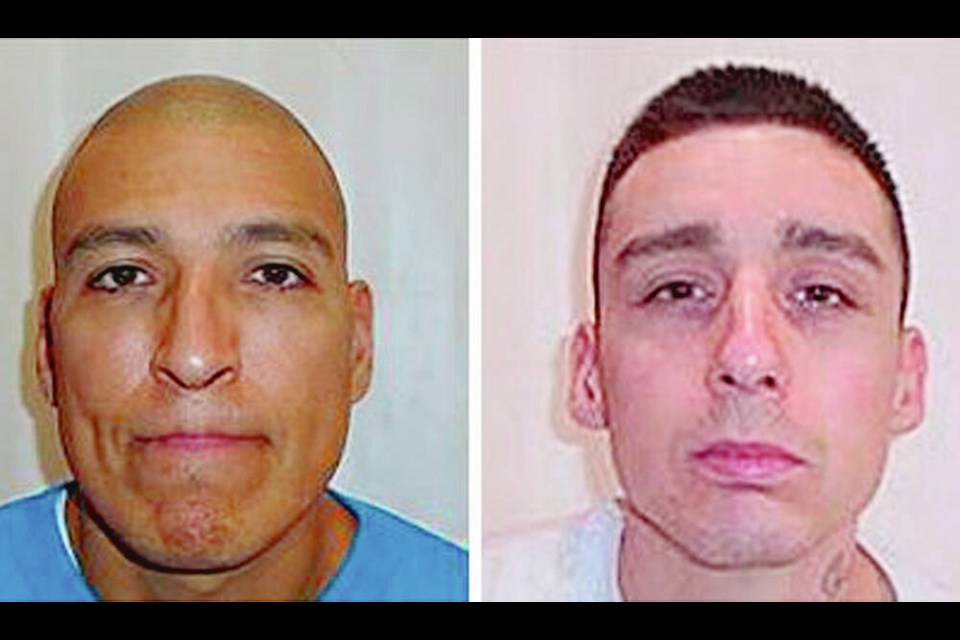On the evening of July 7, 2019, Clayton Reynolds was watching TV with his wife Janet when he heard “a very sharp knocking” on his front door.
The retired physician wasn’t expecting anyone at that late hour at his home in rural Metchosin, so he got up to investigate, he testified Wednesday at the murder trial of Zachary Armitage and James Lee Busch.
The two men, who escaped from the William Head minimum-security prison that evening, are charged with the first-degree murder of 60-year-old Martin Payne of Metchosin. Both pleaded not guilty Monday morning when their joint trial began in Vancouver.
Reynolds told the jury that he turned on the light and saw two men standing in front of the door. The first man was about 25 years old, quite tall and thin. He was wearing a baseball cap and appeared to be in good shape, Reynolds recalled. The second man was bald with a darker complexion. He was shorter and seemed to be substantially older than the first man.
“I spoke first. In a loud voice I asked what they were doing there and what they wanted,” Reynolds testified. “The younger man, the only man who spoke, said they were lost and they wanted to come in and use the phone.”
Reynolds said no, they couldn’t come in. He tried to find out why they were there. They said something but Reynolds couldn’t make out the words because his hearing isn’t good. It seemed like they were asking for a place they could go to, he testified. It wasn’t a specific address. It is more like a region or an area they wanted to get to.
“I decided to bluff it and try to get them to get off our property,” said Reynolds, apologizing as he stopped for a moment to compose himself. “So I decided to make something up to get them off the property and I told them to go down the driveway and turn left.”
Reynolds didn’t want to open the door or confront the men physically.
“I wanted to get them away by making up a sentence and some directions and it worked,” he told Crown prosecutor Sophia Bakken. “They just turned around and went out of my sight.”
After the men left, Reynolds and his wife made sure all of the doors were locked and the windows closed.
The next morning, his wife, who had already left the house, sent him the link to an article about two men who had escaped from William Head.
“And the pictures were of the two men I had seen the night before,” Reynolds testified. “I called the local RCMP and reported my encounter. And later that day, I gave a statement to police.”
Ambrose Oba-Underwood, a civilian member of the RCMP and an expert in digital forensics, testified that he had analyzed the computer belonging to Payne, the homicide victim. Oba-Underwood was told police were investigating a murder. He was asked to search the computer, focusing on entries made on July 8 and 9, 2019, then turn over the recovered data to the investigator.
Oba-Underwood told Crown prosecutor Chandra Fisher the Google Chome browser was used at at 6:57 a.m. on July 8, 2019, to search “Victoria news today.” A minute later, “Victoria CTV news” was searched.
From 7:03 a.m. to 7:37 a.m., Google Chrome was used to search pornography sites.
Oba-Underwood testified he found searches for the Correctional Service of Canada, William Head Institution and a “wanted individuals” page. “Private water taxi to Vancouver,” “private water taxi Victoria, B.C.” and “private water taxi Vancouver Island B.C,” were also searched.
There were searches for Facebook, FaceTime, the Vancouver Sun, CTV News and Global News, where articles about the prison escape were posted.
“There was also a search for Zachary Armitage,” testified Oba-Underwood.
There were no searches on July 9, 2019.



